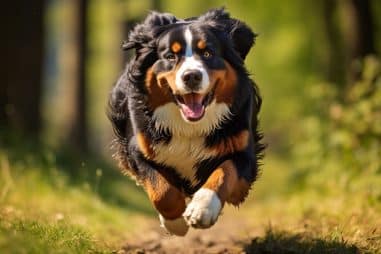A Bernese Mountain Dog is a large, friendly companion with a gentle temperament. Hailing from the Swiss Alps, these dogs were bred to work on farms. Like every other living creature, they need a balanced diet to stay healthy and active. Your furry friend’s diet plays a vital role in their overall health and well-being. In this guide, you’ll find the essential information about what to feed your Bernese Mountain Dog and how to keep them hydrated.
Understanding the Nutritional Needs of a Bernese Mountain Dog
Bernese Mountain Dogs are quite large, and their diet should provide the nutrients they need to maintain a healthy weight and energy level. They require a balanced diet that includes proteins, fats, carbohydrates, vitamins, and minerals.
- Proteins: They are the building blocks for growth and energy. Your dog needs high-quality protein from meat, fish, or poultry.
- Fats: Good fats provide energy, help to absorb vitamins, and promote healthy skin and coat.
- Carbohydrates: They provide the energy your dog needs to stay active and playful.
- Vitamins and Minerals: These are essential for various body functions, helping to keep your dog healthy and strong.
It’s essential to provide a balanced diet to meet the nutritional needs of your Bernese Mountain Dog, tailored to their age, size, and activity level.
What Is the Best Dog Food for Bernese Mountain Dogs?
When it comes to feeding your Bernese Mountain Dog, quality is key. High-quality commercial dog food that meets the nutritional standards set by the Association of American Feed Control Officials (AAFCO) is a good choice. These foods are formulated to provide a balanced diet for your dog.
Some trusted brands include Hill’s Science Diet, Royal Canin, and Blue Buffalo. These brands have specific formulas for large breeds like the Bernese Mountain Dog.
It’s always a good idea to consult your vet before changing your dog’s diet. They can provide recommendations based on your dog’s individual needs.
What Is the Best Non-Commercial Dog Food for Bernese Mountain Dogs?
Feeding your Bernese Mountain Dog a balanced and nutritious diet is essential for their health and well-being. If you prefer not to use commercial dog food, there are other options like home-cooked meals or raw diets. However, preparing a balanced meal for your dog can be a bit tricky, and it’s crucial to consult with a veterinarian to ensure the meals meet the nutritional needs of your Bernese Mountain Dog. Here are some alternative dog food options and tips:
Home-Cooked Meals
Home-cooked meals allow you to control the ingredients and avoid any preservatives or additives found in commercial dog foods. Here are some tips:
- Protein: Include high-quality protein sources like chicken, beef, turkey, or lamb. Bernese Mountain Dogs need protein to maintain muscle mass and overall body function.
- Carbohydrates: Incorporate nutritious carbohydrates like sweet potatoes, brown rice, or quinoa to provide energy.
- Vegetables: Add a variety of vegetables like carrots, green beans, and peas for fiber and essential nutrients.
- Healthy Fats: Include sources of healthy fats like olive oil or flaxseed to promote a shiny coat and good skin health.
Always cook the meat thoroughly to eliminate any harmful bacteria, and avoid using any seasonings or ingredients that are toxic to dogs like onions, garlic, and certain spices.
Raw Diet
Some people believe a raw diet, often referred to as BARF (Biologically Appropriate Raw Food), is beneficial for dogs. A raw diet typically includes:
- Raw meat and bones
- Organ meats
- Eggs
- Some dairy like yogurt
- Some vegetables and fruits
However, raw diets can be controversial and come with risks like bacterial contamination and nutritional imbalances. It’s crucial to consult with a vet if you’re considering a raw diet for your dog.
Balanced Diet
Whether you choose home-cooked meals or a raw diet, ensure the diet is balanced and meets the nutritional needs of your Bernese Mountain Dog. Consulting with a veterinarian or a canine nutritionist can help tailor a diet plan to your dog’s individual needs.
Supplements
If necessary, your vet may recommend supplements to ensure your dog is getting all the essential nutrients, especially if you are preparing home-cooked meals.
Remember, every dog is unique, and what works well for one Bernese Mountain Dog may not work as well for another. It’s always best to work closely with your vet to determine the best diet for your furry friend.
What to Feed a Bernese Mountain Dog Puppy
Puppies are growing rapidly and need a diet high in protein and calories. Look for puppy food formulated for large breeds. These foods provide the nutrients necessary for healthy growth and development.
Transitioning to adult dog food should be done gradually over a week to avoid upsetting your puppy’s stomach. Start by mixing a small amount of adult food with the puppy food, gradually increasing the adult food portion each day.
How Much Do Bernese Mountain Dogs Eat?
The amount of food your Bernese Mountain Dog needs can vary based on their age, size, and activity level. On average, adult Bernese Mountain Dogs eat 3 to 5 cups (0.7 to 1.2 liters) of dog food per day. Puppies need more food relative to their weight because they are growing.
Measuring your dog’s food and following the feeding guidelines on the dog food package or those provided by your vet can help prevent overfeeding and obesity.
Can Bernese Mountain Dogs Eat Human Food?
While it might be tempting to share your food with your Bernese Mountain Dog, not all human foods are safe for them. Safe options include plain cooked meat, rice, and certain vegetables. Avoid foods like chocolate, grapes, and onions as they can be toxic to dogs.
If you want to share a treat with your dog, it’s best to stick to dog-safe human foods and keep the portions small.
What Fruits Can Bernese Mountain Dogs Eat?
Fruits can be a healthy treat for your Bernese Mountain Dog when given in moderation. They can provide essential nutrients and are often low in calories. However, not all fruits are safe for dogs. Here’s a breakdown of some fruits that are safe, and those that should be avoided:
Safe Fruits:
- Apples: They are a good source of vitamins A and C as well as fiber. However, ensure to remove the seeds and core as they can be choking hazards.
- Bananas: They are high in potassium and other vitamins but are also high in sugar, so they should be given in moderation.
- Blueberries: They are packed with antioxidants and are a healthy treat for your Bernese Mountain Dog.
- Strawberries: They are also rich in antioxidants and provide a range of vitamins and minerals.
- Watermelon: It’s a hydrating and nutritious treat, just be sure to remove the seeds.
- Pears: They provide good amounts of vitamins and fiber, but like apples, the seeds should be removed.
- Oranges: They are okay in moderation, but due to their high acidic and sugar content, they should be a rare treat.
- Peaches and Plums: The flesh is okay but avoid the pits as they can be toxic and pose a choking hazard.
Fruits to Avoid:
- Grapes and Raisins: These are highly toxic to dogs and can lead to kidney failure.
- Cherries: They are dangerous because they contain cyanide, which is toxic to dogs.
- Avocado: It contains a substance called persin, which can be harmful to dogs.
- Citrus Fruits (in large quantities): While a small amount is okay, a large quantity can cause stomach upset due to the acidity.
When offering fruits to your Bernese Mountain Dog, it’s crucial to introduce them gradually to see how your dog reacts, and it’s always a good practice to consult with your vet. Some dogs may have sensitive stomachs and may not react well to certain fruits.
Here are some tips for safely offering fruits to your Bernese Mountain Dog:
- Always wash fruits thoroughly to remove any pesticides or chemicals.
- Start with small amounts to see how your dog reacts.
- Remove all seeds, pits, and cores to prevent choking or other hazards.
- Avoid feeding your dog any fruit that’s been in contact with other foods, especially if they contain ingredients that are toxic to dogs like chocolate or xylitol (a sweetener found in many human foods).
Remember, while fruits can be a healthy treat, they should not make up a significant portion of your dog’s diet. They are best used as an occasional treat or reward. The primary diet of your Bernese Mountain Dog should be a high-quality dog food that meets their nutritional needs. This way, you can ensure your dog stays healthy and happy!
Safe Vegetables and Other Foods
Vegetables like carrots, green beans, and sweet potatoes are safe for your Bernese Mountain Dog. They can be a great source of additional nutrients and fiber.
Introduce new foods to your dog’s diet gradually to see how they react to them. It’s always a good idea to consult with your vet when adding new foods to your dog’s diet.
Can Bernese Mountain Dogs Drink Milk?
Some Bernese Mountain Dogs may have trouble digesting lactose, which is found in cow’s milk. If you notice any digestive upset after giving your dog milk, it’s best to avoid it.
There are dog-specific milk replacers available that are easier on your dog’s stomach if they enjoy the taste of milk.
Water Intake for Bernese Mountain Dogs
Water is crucial for your dog’s health. Make sure fresh water is available for your dog at all times.
On average, dogs should drink about an ounce (30 ml) of water per pound (0.45 kg) of body weight per day. However, Bernese Mountain Dogs may need more water if they are active or if the weather is hot.
Conclusion
Feeding your Bernese Mountain Dog a balanced diet and ensuring they have plenty of fresh water is crucial for their health and happiness. Consult with your vet to tailor a diet plan that meets the individual needs of your Bernese Mountain Dog, and enjoy the companionship of your healthy, happy furry friend for years to come.








